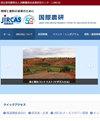保护和促进农业生物多样性利用的三十年:不断变化的全球视角、范式转变及其影响
IF 0.5
4区 农林科学
Q4 AGRICULTURE, MULTIDISCIPLINARY
引用次数: 0
摘要
在这项研究中,我们探讨了近30年来全球植物遗传资源(PGR)研究重点和策略的变化,并研究了同一时期捐助者策略的变化,具体参考了日本对PGR工作的支持。我们根据PGR问题的领导者Bioversity International发表的报告进行了定量文本分析,并研究了22年间(1998-2020年)某些术语和单词出现频率的变化,并将其分为六个阶段。结果表明,在此期间,生物多样性国际的重点从强调遗传资源的收集和基因库的保护转变为通过跨代可持续利用进行保护。这进一步演变为以“食物”为中心的方法。最近,重点转向“粮食系统”方法,强调农业、环境和营养之间的联系。提出了组织在不同阶段的优先问题。在同一时期,日本政府的投资战略已从支持植物遗传资源收集工作转向(在来源国和日本)建设研究人员的能力,并从植物遗传资源中创造更多的利益,包括营养、健康和经济利益,造福作为植物遗传资源守护者的当地社会。介绍了包括主要作者在内的日本研究人员参与的各种研究活动,这些活动具有转型不同阶段的特点。当前全球转向粮食系统方法,强调农业、营养和环境之间的联系,鼓励私营部门的参与,因此,与资源丰富的国家建立伙伴关系将被认为是未来粮食作物遗传资源活动的重要组成部分。附加关键词:保护,日本援助,植物遗传资源本文章由计算机程序翻译,如有差异,请以英文原文为准。
Three Decades of Safeguarding and Promoting Use of Agricultural Biodiversity: Changing Global Perspectives, Paradigm Shifts and Implications
In this study, we explore the global shifts in research priorities and strategies with respect to Plant Genetic Resources (PGR) over a period of nearly 3 decades and also look at changes in donor strategies over the same period, with specific reference to Japanese support to PGR work. We conducted a quantitative text analysis based on reports published by Bioversity International, a leader in PGR issues, and looked at changes in the frequency of appearance of certain terms and words over a 22-year period (1998-2020), divided into six phases. Results show that over the period, Bioversity International’s focus transitioned from an emphasis on collection of genetic resources and conservation in genebanks to conservation through sustainable use across generations. This evolved further to “food” -centered approaches. More recently, the emphasis is shifting to “food system” approaches with emphasis on the linkages between agriculture, environment and nutrition. The priority issues of the organization at the different phases are presented. Over the same period, Japanese government investment strategies have shifted from supporting PGR collection work to building capacity of researchers (in both source countries and Japan) and creating more benefits from PGR including nutrition, health and economic benefits to local societies who are the keepers of the PGR. The involvement of Japanese researchers, including the main author, in the various research activities characteristic of the different phases of the transition is presented. In the current global shift towards food systems approaches where the linkage of agriculture, nutrition, and the environment is emphasized, and the involvement of the private sector encouraged, partnerships with resource rich counters will be considered important in PGR activities in the future. Discipline: Biotechnology Additional key words: conservation, Japan’s assistance, plant genetic resources
求助全文
通过发布文献求助,成功后即可免费获取论文全文。
去求助
来源期刊
CiteScore
1.00
自引率
25.00%
发文量
42
审稿时长
>36 weeks
期刊介绍:
The Japan Agricultural Research Quarterly (JARQ) is a publication of the Japan International Research Center for Agricultural Sciences (JIRCAS), which provides readers overseas with the latest information on key achievements and developments in agricultural research in Japan, with the expectation that this information would contribute to the agricultural development of countries in tropical and subtropical regions.

 求助内容:
求助内容: 应助结果提醒方式:
应助结果提醒方式:


